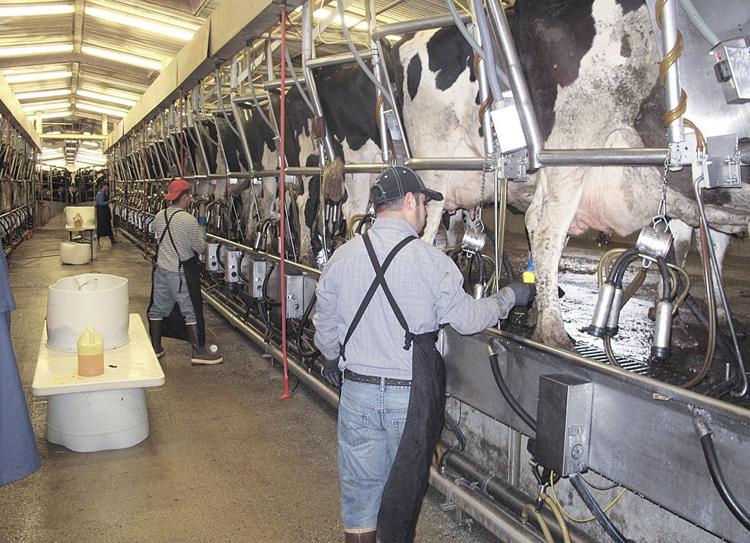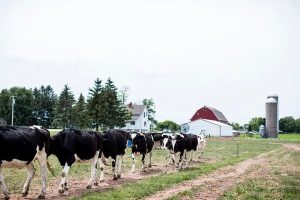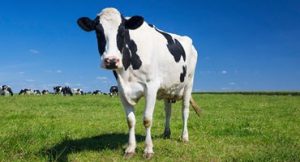
The court ruled 5-4 that farmworkers labor under dangerous conditions and are constitutionally entitled to time-and-half pay for hours worked over 40 in a week.
A Washington State Dairy Federation official called the decision “earth shattering.” The Washington Farm Bureau said it was “horrible.”
Victorious lawyers celebrated the decision, saying it will discourage farms from overworking employees. The United Farm Workers said it made right a “racist historical wrong.”
Dan Fazio, the executive director of the farm labor association WAFLA, said farmworkers will lose pay as producers seek ways to reduce their need for labor.
“It’s a win for the robotics industry,” he said.
The ruling left room to interpret its scope. The case was filed by two former milkers at the DeRuyter Brothers Dairy in Yakima County. Narrowly read, the decision says that in the future dairy workers must be paid overtime.
More broadly, the decision points to making the state’s roughly 160,000 farmworkers eligible for overtime.
“I think it gets us almost all the way there,” said Columbia Legal Services attorney Lori Isley, who argued the case in front of the Supreme Court.
The most telling commentary on the ruling came from the four dissenting justices.
“Based on the majority’s ruling, farmworkers will now be entitled to future overtime pay, a substantial benefit,” Justice Debra Stephens wrote.
WAFLA recommended its members immediately begin paying overtime.
“Employers should proceed conservatively or plan on being sued,” Fazio said. “I don’t think there’s any doubt the ruling is convoluted.”
The court didn’t rule on whether farmworkers are eligible for back overtime pay. Another state law allows underpaid workers to seek back pay for up to the past three years.
Some justices said workers should get back pay. Some said it would be unfair to farmers. Neither position got a majority, however.
Justices who opposed applying the decision retroactively noted that farmers were following the law. Federal law exempts farmworkers from overtime pay. Washington has mirrored the federal exemption since 1959.
Lawmakers in four states — California, Maryland, Minnesota and New York — have enacted limited overtime pay for farmworkers. Washington will be the first state to have a court-ordered elimination of the entire exemption.
“I think there’s very little doubt this is an activist court,” Fazio said. “This is just going to in the long term accelerate off-shoring” of agriculture.
Dairy Federation policy analyst Scott Dilley said the decision instantly changed the law for dairy farmers.
“There’s no phase. There’s no grace period,” he said. “It’s disheartening and it hurts.
“I think every producer is going to look at increasing robotics and other labor-saving devices,” Dilley. “The decision likely will drive consolidation, and that’s unfortunate.”
The dairy workers argued that denying them overtime pay was racist and violated the state’s constitution by withholding from them privileges given to other citizens.
The most persuasive argument was that dairy workers have hazardous jobs. Article II, Section 35 of the state constitution directs lawmakers to pass laws to protect workers in dangerous occupations.
“The extremely dangerous nature of dairy work entitles dairy workers to the statutory protection set out in Article II, Section 35,” Justice Barbara Madsen wrote in the ruling opinion.
The four dissenting judges said the Legislature has met its obligation to protect farmworkers by passing safety laws.
Madsen said it couldn’t be left up to the Legislature to decide if it had done its constitutional duty.
Madsen also cited a 1983 state Supreme Court decision involving cherry and hop pickers. In that case, the court declared in general that farm work was an “extremely dangerous occupation.”
Justices Steven Gonzalez, Sheryl Gordon McCloud, Mary Yu and Charles Wiggins signed Madsen’s opinion, forming the majority.
Gonzalez, Gordon McCould and Yu issued a separate concurring opinion that was a general indictment of the way farmworkers are treated.
Written by Gonzalez, the court’s incoming chief justice, the opinion said the decision should be applied retroactively.
Gonzalez acknowledged that farmers were following the law by not paying overtime, but that the inequities suffered by farmworkers outweighed that.
Courts, according to Gonzalez, should protect farmworkers as they do foster children.
“Excluding farmworkers from health and safety protection cannot be justified by an assertion that the agricultural industry, and society’s general welfare, depends on a caste system that is repugnant to our nation’s best self,” he wrote.
In the dissenting opinion, Chief Justice Debra Stephens said treating adults as a vulnerable class would be a “tectonic shift in federal and state equal protection jurisprudence.”
Stephens and Justices Charles Johnson, Mary Fairhurst and Susan Owens were the four dissenters.
They said who gets overtime pay is up to the Legislature and is not a fundamental right of citizenship.
They also produced a second dissent — written by Johnson — that said it would be unfair to farmers to apply the decision retroactively.
To recap, three justices favored applying the decision retroactively and four were opposed. Farm Bureau CEO John Stuhlmiller said that offered some “glimmer of hope.”
In recent years, farmers have been battered by port slowdowns and trade wars, he said. It’s been hard to stash away money to handle back pay claims, he said.
“It’s been a rough several years for agriculture,” Stuhlmiller said.
The DeRuyter case will now go back to Yakima County Superior Court for further proceedings, guided by the Supreme Court’s ruling.
If the back-pay issue comes back to the Supreme Court, the court will have two new members appointed by Democratic Gov. Jay Inslee. Wiggins, part of the majority, and Fairhurst, one of the dissenters, have retired.
Washington had the highest state minimum wage in the U.S. in 2020 at $13.50 an hour. It will go up to $13.69 on Jan. 1. It’s tied with Oregon for having the highest minimum wage for foreign seasonal workers at $15.83 an hour.
It’s unknown how much overtime pay will cost farms. The Farm Bureau and Dairy Federation said in court filings that overtime would cost “tens if not hundreds of millions of dollars per year.”

























